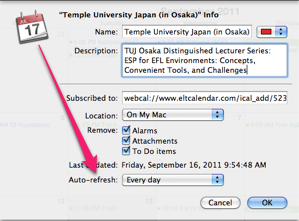Okayama JALT:
November Meeting: Research and Materials from Three Presenters
Date: Saturday, November 11th, 2017 Time: 3:00 PM - 5:00 PM
Speaker: Neil Cowie and Keiko Sakui; Masayuki Teranishi; Paul Goldberg
Description:
1. SLA research and classroom teaching: Is there any connection?
In 2005, in order to build a stronger bridge between theory and practice, Professor Rod Ellis synthesised a list of ten important teaching principles that were based on second language acquisition (SLA) research (e.g., teachers should focus on meaning and form). In this presentation the ten principles will first be described and participants will be asked to reflect on how useful or relevant they are in their own teaching contexts. Then a study exploring how the ten principles have been interpreted by language teachers in New Zealand will be introduced. Although the data is confined to primary and secondary education in New Zealand these results are hopefully relevant to other teaching and learning contexts in that they shed light on how SLA research and actual classroom practices can inform each other to increase the effectiveness of foreign language teaching and teacher training.
2. Literature and language learning in the EFL classroom
Published in 2015, Literature and Language Learning in the EFL Classroom (edited by Masayuki Teranishi, Yoshifumi Saito, and Katie Wales, 2015, Palgrave Macmillan) has had a significant influence on studies in related fields. In this talk, while reviewing the contents of this book, I would like to reconsider the role of literature in English language education and learning. In particular, I would like to focus upon the following issues: the definition of literature and literary texts, pedagogical merits of reading literature as an EFL student, case studies and model practices in Japanese EFL classrooms.
3. The benefits of doing extensive reading online with Xreading
Online extensive reading means much more than students being able to read graded readers on their computers or smartphones. It can put powerful tools like an interactive dictionary, character lists, and audio-on-demand, right at their fingertips. Additionally, online extensive reading allows teachers to monitor and track their students’ reading progress. Teachers can know which books their students have selected, how many words they read, and even their reading speed. Finally, because of all of the rich reading data that can be collected, online extensive reading is ideal for academics interested in doing research on extensive reading. In this presentation, the speaker, who developed Xreading, a commercial website that provides students with unlimited access to hundreds of graded readers from major publishers such as OUP, CUP, and Cengage, will explain how teachers can get the most out of using online extensive reading with their classes, and give a demonstration of the Xreading system.
Organization: Okayama Chapter of the Japan Association for Language Teaching (Okayama JALT)
Cost: free
Venue: Okayama University General Education D Building, Rm D24 (2nd floor)
Location: Okayama City, Okayama Prefecture, Japan
![]() Add this to iCal
Add this to iCal
![]() (Need help?)
(Need help?)
![]() Add to Outlook
Add to Outlook
![]() (Need help?)
(Need help?)
You can add this event to your iCal calendar.
- Click on the iCal icon. Your iCal software will start.
- Click 'Subscribe':

- Under 'Auto Refresh', select 'Every day' in case the the basic details change:

You can add this event to your Microsoft Outlook calendar.
- Click on the MS Outlook icon.
- See what happens.
- Tell us what happens. I don't have MS Outlook on a Windows computer, so I can't test it.
- If you click on the icon and nothing happens, do this:
- Right-click on the icon and save the file.
- According to Microsoft's support page, in Outlook's File menu, you should click Import and Export.
- Click to select Import an iCalendar or vCalendar file (*.vcs), and then click Next.
- Click to select the vCalendar file you've just saved, and then click Open.
Contact Okayama JALT
Website: sites.google.com/site/okayamajalt/
Email QR Code:





